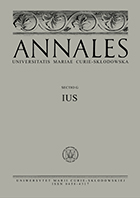Obowiązek lojalności pracownika po ustaniu stosunku pracy
Duty of Loyalty of an Ex-employee
Author(s): Urszula TORBUSSubject(s): Civil Law
Published by: Wydawnictwo Naukowe Uniwersytetu Marii Curie-Sklodowskiej
Keywords: disloyalty; unfair competition; non-competition covenant; garden leave
Summary/Abstract: Duty of loyalty after a termination of employment contract is limited. It does not result from employment relationship, based on mutual confidence and trust, but is guaranteed by separate regulations – Unfair Competition Act of 1993 (UCA) or an additional covenant, introducing non-competition clause after termination of employment contract. UCA protects only against unfair competition, in other words, a qualified disloyalty of an ex-employee, aimed at causing damage to a former employer. It may involve a disclosure of trade secrets or a takeover of customers or employees. However, as long as this is not accompanied by unlawful soliciting or dishonest intentions, a submission of job or cooperation offers to employees or clients of a former employer is not prohibited, as it is considered a way of acquiring clients or employees on a free market.Wider protection can be granted by concluding a covenant with non-competition clause after a termination of employment contract, provided by Article 1012 of the Labour Code (LC). The LC grants a wide freedom to the employer in assessing whether to conclude such a covenant, limited merely to the obligation to pay to the ex-employee a relatively low compensation in the amount not lower than 25% of the remuneration received before the termination of the employment contract. However, a non-competition clause cannot prevent the ex-employee from earning his living. Thus, the obligation of loyalty after the termination of the employment contract is limited to the prohibition of competitive activity, including unfair competition.LC also allows the employer to protect his interests against disloyalty of an employee who is about to leave his employment by forcing a gardening leave. Since LC Amendment of 2016, it does not require the employee’s consent.
Journal: Annales Universitatis Mariae Curie-Skłodowska, sectio G – Ius
- Issue Year: 65/2018
- Issue No: 2
- Page Range: 283-300
- Page Count: 18
- Language: Polish

